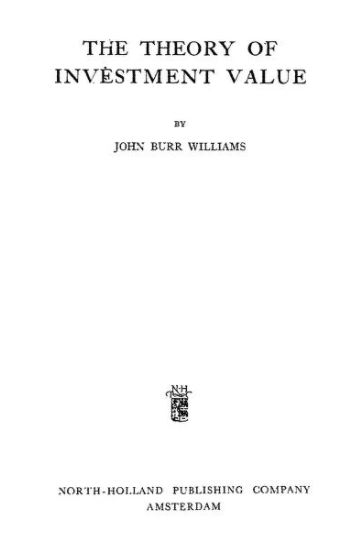‘The Theory of Investment Value’ PDF Quick download link is given at the bottom of this article. You can see the PDF demo, size of the PDF, page numbers, and direct download Free PDF of ‘The Theory of Investment Value’ using the download button.
The Theory of Investment Value Book PDF Free Download

The Theory Of Investment Value
REAL WORTH AND MARKET PRICE
Separate and distinct things not to be confused, as every thoughtful investor knows, are really worth and market price.
No buyer considers all securities equally attractive at their present market prices whatever these prices happen to be; on the contrary, he seeks “the best at the price.
” He picks and chooses among all the stocks and bonds in the market until he finds the cheapest issues. Even then he may not buy at all, for fear that everything is too high and nothing will give him his money’s worth.
If he does buy, and buy as an investor, he holds for income; if as a speculator, for profit. But speculators as a class can profit only by trading with investors.
To whom they can sell only for income; therefore in the end all prices depend on someone’s estimate of future income.
Of investment 2 value in this sense some men will make one estimate, others another, and of all these estimates only one will coincide with, the actual price, and only one with the true worth.
Our problem, therefore, is twofold: to explain the price as it is, and to show what price would be right. Part I of this book will deal with the first question, Part II with the second.
If the investor chooses his holdings wisely, he can make quite as much money as the speculator. In fact, he can probably make more, or so it would seem from the history of great fortunes.
But to buy when security goes below its true worth, and to sell when it goes above it, is not enough to constitute wise investment.
Such a policy would put the buying and selling points very close together, and in the end, would yield no more than pure interest on the fund so invested.
REAL WORTH AND MARKET PRICE
Separate and distinct things not to be confused, as every thoughtful investor knows, are real worth and market price. No buyei; considers all securities equally attractive at their present market prices whatever these prices happen to be; on the contrary, he seeks “the best at the price.”
He picks and chooses among all the stocks and bonds in the market until he finds the cheapest issues. Even then he may not buy at all, for fear that everything is too high .–and nothing will give him his money’s worth. If he does buy, and buy as an investor, he holds for income;
if as a speculator, for profit. But speculators as a class can profit only by trading with investors,^ to whom they can sell only for income; therefore in the end all prices depend on someone’s estimate of future income.*
Of investment value in this sense some men will make one estimate, others another, and of all these estimates only one will coincide with, the actual price, and only one with the true worth.
Our problem, therefore, is twofold: to explain the price as it is, and to show what price would be right. Part I of this book will deal with the first question. Part II with the second.
DEFINITION OF AN INVESTOR
As will be shown later, the longer a buyer holds a stock or bond, the more important are the dividends or coupons while he owns it and the less important is the price when he sells it. In the extreme case where the security is held by the same family for generations, a practice by no means uncommon, the selling price in the end is a minor matter.
For this reason we shall define an investor as a buyer interested in dividends, or coupons and principal, and a speculator as a buyer interested in the resale price.® *Thus the usual buyer is a hybrid, being partly investor and partly speculator.
Clearly the pure investor must hold his security for long periods, while the pure speculator must sell promptly, if each is to get what he seeks.
If the investor chooses his holdings wisely, he can make quite as much money as the speculator. In fact, he can probably make more, or so it would seem from the history of great fortunes.
But to buy when a security goes below its true worth, and to sell when it goes above it, is’ not enough to constitute wise investment, for such a policy would put the buying and selling points very close together, and in the end would yield no more than pure interest on the fund so invested.
Wise investment requires that only such issues as are selling far below their true worth should be bought; then, as large income payments are received in subsequent years because things turn out better for the security than most people expected, a handsome return on the principal can be enjoyed.*
| Author | John Burr Williams |
| Language | English |
| Pages | 648 |
| PDF Size | 56.6 MB |
| Category | Business |
Related PDFs
Plumbing Materials Name List PDF
The Warren Buffett Way: The World’s Greatest Investor PDF
The Theory Of Investment Value Book PDF Free Download
